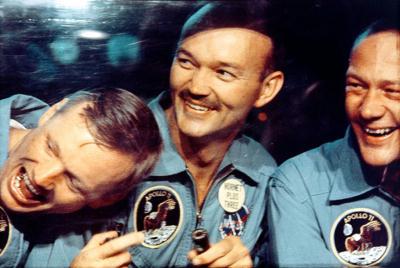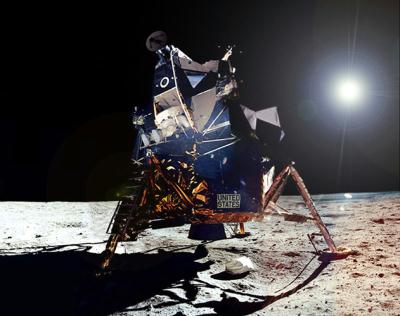''In the Shadow of the Moon'' Premieres at the Smith Opera House
The excitement, majesty and extraordinary human accomplishment of the American space program of the '60s and early '70s is rousingly captured in "In the Shadow of the Moon." Deftly mixing a treasure trove of archival, never-seen footage with engaging commentaries of surviving astronauts from all nine Apollo moonshots, this awe-inspiring documentary will bring it all back for those with first-hand memories of the time, while providing a stimulating primer for younger generations.
"From space," says Jim Lovell, commander of the star-crossed Apollo 13 mission, "you could block out the cloud-swirled sphere of Earth just by holding up your thumb."
Mike Collins, the astronaut who remained in the command module while Neil Armstrong and Buzz Aldrin took those small steps for mankind back in 1969, talks about how fragile Earth looked from afar: "a tiny gem glinting in endless black."
"In the Shadow of the Moon" is a revelation. With no portentous celebrity narration -- just the talking heads of Lovell, Collins and eight of their Apollo brethren -- it recalls the bold mandate set forth by President John F. Kennedy to put a man on the lunar surface by the end of the 1960s. Amazingly, despite lethal failures, technology that now looks laughingly primitive, and a world quaking with catastrophe, the job was done.
Backed by endlessly wonderful archival footage, the fliers themselves recount their selection process, their training and the setbacks, most notably the tragic 1967 fire during a simulated countdown that killed three astronauts; it's a wonder the program continued apace in its wake.
Informed by the CIA that the Russians were getting close to putting a spacecraft into lunar orbit, the U.S. moved quickly to send Apollo 8 around the moon at Christmas, 1968. After two more test flights, it was time for the real thing, and NASA gave itself a window for three attempts at a moon landing in the second half of 1969. Fortunately, the first one worked, and Neil Armstrong became the first man on the moon on July 21.
Armstrong, famously reclusive, is conspicuous by his absence. But his fellow spacemen pick up the slack, telling a tale that says much about America then and now, about the powers of science, the courage of man, and the possibilities of a higher force.
They are a lively, thoughtful, impressive bunch; some are more macho, others humorous or self-deprecating. But to a man, they possess something in common that sets them apart -- a humbled, philosophical side that, whether they state it or not, came from journeying to another world and seeing our own from afar. One can sense that they are changed men for having done what they did -- 24 men have traveled to the moon, and only 12 have ever walked on the surface -- and this sense of a special perspective comes through clearly.
Aside from the great footage of the flights and moonwalks themselves, "In the Shadow of the Moon" makes a point of showing the elated international reactions to this "one giant step for mankind." Docu material from all around the non-communist world shows people thrilled about the accomplishment, and the film's implicit comment is that, despite concurrent events in Vietnam, this was when global regard for the United States was at its highest level. Looking at it another way, one of the astronauts states that, when he and his colleagues say "we" went to the moon, they don't mean just them personally or the U.S. as a nation, but all of humanity.
Perhaps because their accomplishments were so extraordinary, and their temperaments so cool, "In the Shadow of the Moon" has no need for overstatement, no time for bombast. Even the beautiful score by Philip Sheppard is used to provide punctuation notes, not emotional cues.
Directed by British filmmaker David Sington, the film notes that man has not returned to the moon since December 1972, more than a generation ago. As astronaut Jim Lovell so eloquently put it, "it was a time when we made bold moves."
The overwhelming perspective of the moon voyagers is that, from above, Earth looks like a serene but fragile bastion of life hanging in space, a unique oasis in what otherwise appears to be a void. Any film that can remind viewers of this unique viewpoint, witnessed firsthand by so few, should be welcomed.
Images
''In the Shadow of the Moon'' Premie...
Date and Time
Friday Nov 2, 2007 Tuesday Nov 6, 2007
7 p.m., November 2, 3, 5, and 6
2:00 on November 4
10 a.m. on November 6
Location
Smith Opera House82 Seneca St.Geneva, NY
Fees/Admission
Tickets are $5 general admission and $3 for students and senior citizens.
Website
Contact Information
315-781-LIVE (5483) or toll-free 866-355-LIVE (5483)
Printed courtesy of flxchamber.com/ – Contact the Finger Lakes Area Chamber of Commerce for more information.
One Franklin Square, Suite 202, Geneva, NY 14456 – (315) 789-1776 – info@flxchamber.com



